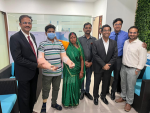
San Francisco: The US Food and Drug Administration (FDA) rejected Elon Musk-run company Neuralink’s bid to implant a chip in a human brain over safety risks, the media reported.
In December last year, Musk had claimed his brain-computer Neuralink’s device is ready for human trials and he is expecting to do so in about six months after experimenting it on pigs and monkeys.
Reuters now reports that FDA rejected Neuralink’s application for a human experiment over several safety concerns, like the device’s lithium battery, implant’s tiny wires and questions how the device can be removed without damaging brain tissue.
“A year after the rejection, Neuralink is still working through the agency’s concerns,” the report said, citing Neuralink’s staffers.
Musk and Neuralink did not comment on the report and the FDA declined to comment.
Neuralink had submitted most of the paperwork needed for a human clinical trial to the US FDA.
“We are now confident that the Neuralink device is ready for humans, so timing is a function of working through the FDA-approval process,” the new Twitter CEO had tweeted.
Neuralink’s goal is to create a device that can be implanted in the brain, and use it to control a computer with brain activity.
The Neuralink devices are tiny, with multiple flexible “threads” that can be inserted into the brain.
“It’s like replacing a piece of your skull with a smartwatch, for lack of a better analogy,” Musk said. He said the device can be upgraded as the time progresses.
Neuralink’s implant is designed to record and stimulate brain activity, which Musk has stated could help people address conditions such as obesity.
Musk claims that Neuralink’s brain chips will one day make humans hyper-intelligent and let paralysed people walk again.
The brain chips were recently implanted in monkeys’ brains during a series of tests at the University of California, Davis.
Since launching publicly in 2017, Neuralink has demonstrated its brain implant in pigs and monkeys.
The main aim of the project is to provide a direct connection between a brain and a computer to overcome the power of Artificial Intelligence, using a “sewing machine-like” device to stitch threads to an implanted brain chip.
IANS



















